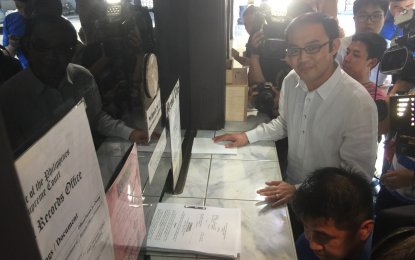Philippine News
Sereno asks SC to junk SolGen quo warranto petition
MANILA — Chief Justice Maria Lourdes Sereno on Monday asked the Supreme Court (SC) to dismiss for lack of jurisdiction the quo warranto petition filed by the Office of Solicitor General (OSG) seeking to nullify her appointment to the judiciary’s top post.
In a 77-page comment to the OSG petition, Sereno, through her lawyers led by Alexander Poblador, said the SC has no authority to remove her from office via quo warranto because the text of the 1987 Constitution, the Constitutional Commission’s deliberations, and established jurisprudence consistently state that impeachable officials like her can be ousted “only by impeachment.”
Article XI, Section 2 of the 1987 Constitution provides that impeachable officials, which include all members of the SC, may only be removed from office upon impeachment by the House of Representatives and conviction by the Senate, sitting as an impeachment court. The SC itself has consistently applied this provision as a limitation on its power to remove public officers.
The high court, she said, “cannot take cognizance of or give due course to the [OSG petition] without running afoul of the plain dictates of the fundamental law and established judicial precedents.”
Sereno said the petition should be dismissed not only because it is demanded by the Constitution and jurisprudence, “but also because the Chief Justice deserves her day in court before the Senate sitting as an Impeachment Tribunal.”
“To rule otherwise, and to preempt the impeachment process by summarily ousting the Chief Justice via quo warranto, would be tantamount to overthrowing the Constitution itself,” Sereno stressed.
Sereno also pointed out the quo warranto petition of the OSG should not be entertained at all by the high court for being “time-barred.”
Section 11, Rule 66 of the Rules of Court, provides that a petition for quo warranto must be filed within one year from the “cause of ouster,” she said.
“There is no authority to commence a quo warranto proceeding more than four years after the expiration of the one-year statute of limitations,” she contended.
Sereno also assailed the OSG for its pretext that she flunked the test of integrity for her alleged failure to submit her Statements of Assets, Liabilities and Net Worth (SALNs) when she was law professor at the University of the Philippines (UP) prior to her appointment to the SC as associate justice in 2010.
She noted that her alleged non-filing of SALNs with the JBC were not included in the impeachment complaint filed by lawyer Lorenzo Gadon and she has not yet been given the opportunity to debunk these allegations.
The country’s top magistrate asserted that she complied with the SALN law when she was a UP law professor and that she is ready to prove this in the Senate impeachment trial, which is the proper forum, “without prejudice to jurisdictional and relevance objections.”
She pointed out that contrary to the claims, it has not been proven that she failed to comply with the SALN laws while in UP, especially since she was cleared by UP of all administrative responsibilities and accountabilities as a member of its law faculty.
Lastly, Sereno argued that the submission of all SALNs for those in government is a requirement that the JBC can waive. She admitted that the JBC waived such requirement for her, but stressed that it also did so for 13 other applicants who had failed to submit their complete SALNs to the JBC.
She said the other applicants for the Chief Justice post in 2012 also did not submit complete SALNs — retired Associate Justices Roberto Abad and Arturo Brion, Senior Associate Justice Antonio Carpio, Associate Justice Teresita Leonardo-De Castro, Deans Raul Pangalangan and Amado Valdez, as well as Congressman Ronaldo Zamora. Except for the two deans, all the others were shortlisted together with Sereno.
Sereno filed her answer to the quo warranto petition as SC officials and personnel again wore red shirts in their flag-raising ceremony for the third consecutive Monday in a symbolic call for her resignation.
In a 34-page petition for quo warranto, Calida seeks SC to declare Sereno’s appointment on Aug.
24, 2012 as Chief Justice as void and oust her from the judiciary’s top post.
The petition emanated from a letter filed by suspended lawyer Eligio Mallari, urging Calida to initiate a quo warranto proceeding against the top magistrate.
Last Feb. 21, Mallari, who called Sereno a “de facto chief justice”, asked the OSG to initiate a quo warranto proceeding against her.
Under Rule 66 of the Rules of Court, a quo warranto proceeding is an action by the government against a person who unlawfully holds a public office or holds a position where he or she is not qualified.
Calida insisted that a quo warranto proceeding is a “proper remedy to question the validity of Sereno’s appointment.”
Calida also said that constitutional basis for ousting Sereno from her office are the following:
Article VIII, Section 5 (1) of the Constitution empowers the Supreme Court to exercise original jurisdiction over Quo Warranto cases, among others.
Article VIII, Section 7 (3) of the Constitution insists that a Member of the Judiciary must be a person of proven competence, integrity, probity, and independence. Unfortunately for respondent Sereno she flunked the test of integrity when she failed to file more or less 10 SALNs.
Article XI, Section 17 (Accountability of Public Officers) requires the submission of SALNs as often as maybe required by law (RA 3109). The blatant disregard by respondent Sereno to comply with the requirements of the law and Constitution proves her lack of integrity hence she is unlawfully holding the position of Chief Justice of the Supreme Court.
Sereno, who is currently on indefinite leave, earlier said her leave is meant for her to prepare her legal defense in her impeachment case, which is expected to reach the Senate anytime soon.






















